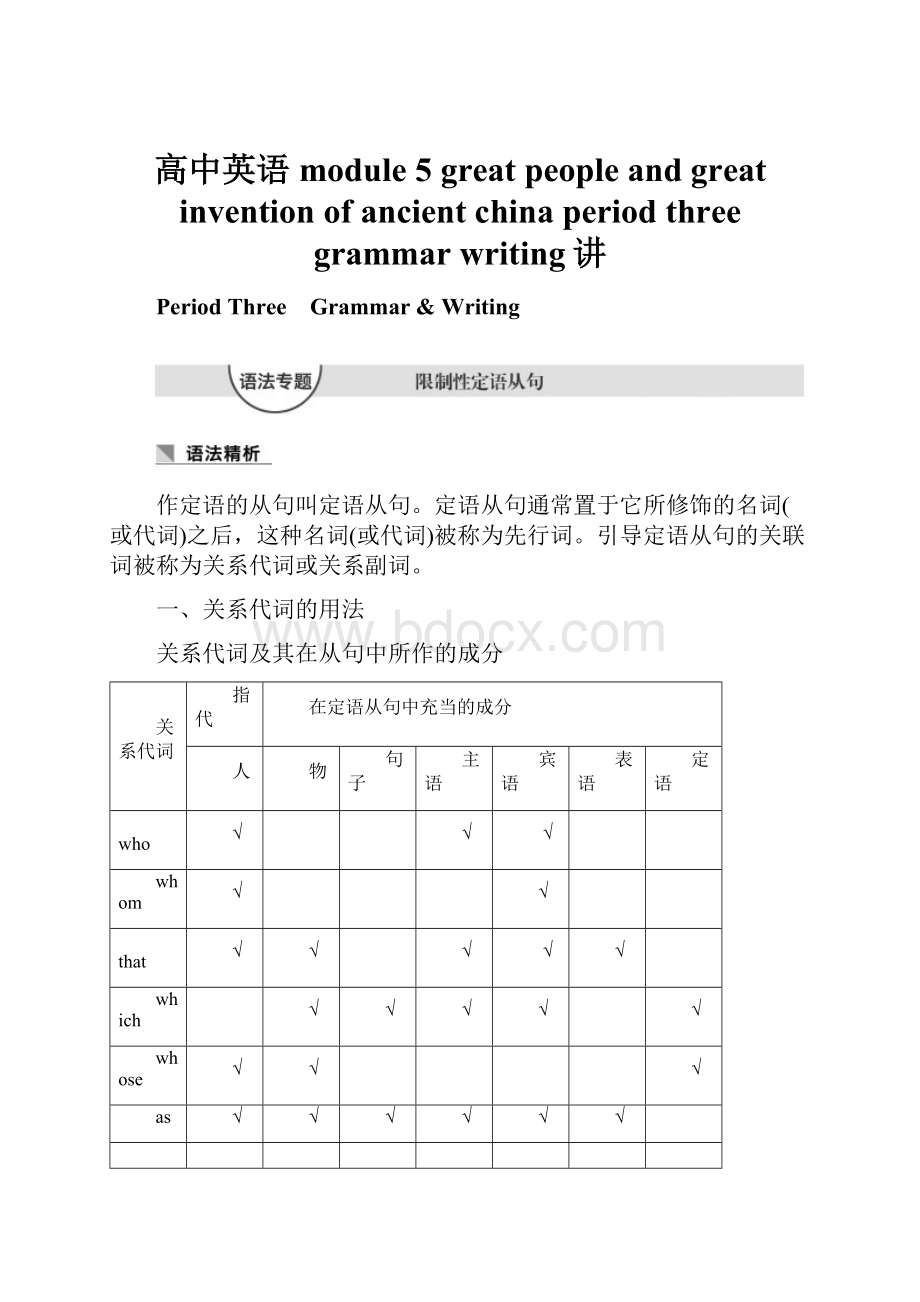高中英语 module 5 great people and great invention of ancient china period three grammar writing讲.docx
《高中英语 module 5 great people and great invention of ancient china period three grammar writing讲.docx》由会员分享,可在线阅读,更多相关《高中英语 module 5 great people and great invention of ancient china period three grammar writing讲.docx(18页珍藏版)》请在冰豆网上搜索。

高中英语module5greatpeopleandgreatinventionofancientchinaperiodthreegrammarwriting讲
PeriodThree Grammar&Writing
作定语的从句叫定语从句。
定语从句通常置于它所修饰的名词(或代词)之后,这种名词(或代词)被称为先行词。
引导定语从句的关联词被称为关系代词或关系副词。
一、关系代词的用法
关系代词及其在从句中所作的成分
关系代词
指代
在定语从句中充当的成分
人
物
句子
主语
宾语
表语
定语
who
√
√
√
whom
√
√
that
√
√
√
√
√
which
√
√
√
√
√
whose
√
√
√
as
√
√
√
√
√
√
Ishethemanwho/thatwantstoseeyou?
他就是想见你的人吗?
Heistheman(whom/that)Isawyesterday.
他就是我昨天看见的那个人。
Canyoushowmethephotowhich/thatwastakenintheWestLake?
你能让我看看在西湖拍的照片吗?
I’llneverforgettheday(which/that)wespenttogether.
我永远不会忘记我们在一起度过的日子。
即时跟踪1 用适当的关系代词填空
(1)Shelivesinahousewhosewindowsallfacesouth.
(2)Jackwhoisalwaysreadytohelpothersisaverykindheartedman.
(3)Heisthemanwho/whomIgottoknowatthemeetingyesterday.
(4)Thetrainwhich/thathasjustleftisforNanning.
(5)ThiswasthesamesituationasIimagined.
二、关系副词的用法
关系副词
指代
先行词
在定语从句中充当的成分
when
时间
时间名词
时间状语
where
地点
地点名词
地点状语
why
原因
reason
原因状语
We’llneverforgetthedaywhenthePeople’sRepublicofChinawasfounded.
我们决不会忘记中华人民共和国成立的那一天。
Theofficewhereheworksisonthesecondfloor.
他工作的办公室在二楼。
Thereasonwhyhedidn’tcomewasunknown.
他没来的原因还不清楚。
即时跟踪2 用适当的关系副词填空
(1)IstillrememberthedaywhenIbecameacollegestudent.
(2)Thatisthereasonwhyheisleavingsosoon.
(3)IforgotthehousewheretheSmithslived.
三、关系代词用that不用which的情况
1.当先行词是不定代词时,如all,everything,anything,nothing,much,few,little,none等。
Allthathehasdoneisoflittlehelp.
他所做的没有一点儿帮助。
2.当先行词前面有theonly,thelast,thenext,few,no,all,thevery等修饰词时。
ThisistheverymanthatIwanttosee.
这正是我想见的那个人。
3.当先行词为序数词/形容词最高级或被序数词/形容词最高级修饰时。
Thisisthefirstletterthathehaswrittentome.
这是他给我写的第一封信。
4.当先行词既有人又有物时。
Weweredeeplymovedbythemanandhisstorythatshetoldus.
她告诉我们的那个人和他的故事深深地打动了我们。
5.当主句是以who,which或what开头的特殊疑问句时。
Whoisthemanthatiswaitingattheschoolgate?
在学校门口等着的那个人是谁?
即时跟踪3 用关系代词that或which填空
(1)Hedidallthathecouldtohelpus.
(2)ThisistheverybusthatI’mwaitingfor.
(3)ThisisthemostinterestingnovelthatI’veeverseen.
(4)WhatisthefirstAmericanfilmthatyouhaveseen?
(5)Canyourememberthescientistandhistheorythatwelearnttheotherday?
四、“介词+关系代词”引导的定语从句
1.关系代词的选定
如果先行词指事(物),关系代词就用which,指人用whom。
Thisistheclassroominwhichwestudiedlastyear.
这就是我们去年学习用的教室。
Hewasouruncleofwhomwewereafraid.
他就是我们都害怕的叔叔。
2.介词的选定
(1)根据先行词来选用介词。
ThereasonforwhichIcamehereisthatIwanttogetyourhelp.
我来这儿的原因是我想得到你的帮助。
ThefarmonwhichIonceworkedhastakenonanewlook.
我曾经工作过的农场呈现出一派新景象。
(2)根据定语从句中的谓语动词或形容词来选用介词。
ThepersontowhomIspokejustnowismyEnglishteacher.
我刚才与之讲话的那个人是我的英语老师。
Chinaofwhichwearegreatlyproudisabeautifulcountry.
我们为之感到非常骄傲的中国是个美丽的国家。
(3)根据句意确定介词。
ThisisthepilotforwhomIboughtacamera.
这个就是我给他买照相机的飞行员。
即时跟踪4
(1)用适当的介词填空
①Inthedarkstreet,therewasn’tasinglepersontowhomshecouldturnforhelp.
②Thepoormanhasnohouseinwhichhecanlive.
③Hebuiltatelescopethroughwhichhecouldstudytheskies.
④Ididn’tknowthereasonforwhichhecamelate.
⑤Isthisthecarforwhichyoupaidahighprice?
(2)用适当的关系代词或“介词+关系代词”填空
①ThisistheshopinwhichImethimforthefirsttime.
②IknowtheboyfromwhomyouborrowedtheEnglishnovel.
③Itwasacrisisforwhichshewastotallyunprepared.
④Thisisthemantowhomweoftenturnforhelp.
=Thisistheman(whom/who/that)weoftenturntoforhelp.
Ⅰ.用适当的关系词填空
1.Ilivenextdoortoacouplewhosechildrenoftenmakealotofnoise.(2016·北京)
2.Someexpertsthinkreadingisthefundamentalskilluponwhichschooleducationdepends.
(2015·安徽)
3.Asthesmallestchildofhisfamily,Alexisalwayslongingforthetimewhenheshouldbeabletobeindependent.(2015·陕西)
4.Thebossofthecompanyistryingtocreateaneasyatmospherewherehisemployeesenjoytheirwork.(2015·天津)
5.Creatinganatmosphereinwhichemployeesfeelpartofateamisabigchallenge.(2015·浙江)
6.Maybeyouhaveahabitthat/whichisdrivingyourfamilycrazy.(2014·新课标全国Ⅰ)
7.Acompanywhoseprofitsfromhomemarketsaredecliningmayseekopportunitiesabroad.
(2014·山东)
8.Pleasesendusalltheinformationthatyouhaveaboutthecandidatefortheposition.(2014·陕西)
9.TheexactyearwhichAngelaandherfamilyspenttogetherinChinawas2008.(2014·安徽)
10.Happinessandsuccessoftencometothosewhoaregoodatrecognizingtheirownstrengths.
(2013·湖南)
Ⅱ.单句改错(每小题仅有1处错误)
1.Thedishes
或whatIcookedwereMom’sfavorite.(2016·四川,短文改错)
2.Third,weshouldfindwaystoreusethewaterusedinwashing,especiallybathwaterforwhichisquitealot,andthatwillsavemuchwater.(2012·大纲全国Ⅱ,短文改错)
3.Afterhearingyoursadstories,hewillsaysomewordsthat
niceandwarm.
(2010·重庆,短文改错)
4.What’smore,agoodfriendiswillingtoofferthehelptowhichyouneed,orcanatleastgiveyousomeadvice.(2010·重庆,短文改错)
5.Hewouldn’tgotoseeaplaythatnoonelikedit.(2008·陕西,短文改错)
6.Itisalsoawindow
whichwecanlearnaboutAmericansociety.(2008·重庆,短文改错)
文体指导
正反对比类议论文是从正反两方面辩证地说明某个观点。
正反对比类议论文在高考中占很大比例,是中学英语写作的重点体裁之一。
正反对比类议论文的表现形式是:
先提出某个现象,然后进行正反两方面的论述,是一种限定性的写作,其论点、论据和论证相对比较简单。
它要求同学们结合题目要求,从正反两个方面陈述各自的理由,要点要全面,层次要清晰,通常最后都要求简述自己的看法,来引发人们的思考。
正反对比类议论文通常分成四段:
第一段综述议论的内容;第二段表述正方观点及理由;第三段表述反方的观点及理由;第四段陈述自己的观点。
正反对比类议论文一般是同一时态,对当前某种观点的议论用一般现在时,对过去讨论的阐述要用一般过去时,最后在表达自己的观点时,要用一般现在时。
正反对比类议论文模板
导入:
第1段
Recentlywe’vehadadiscussionaboutwhetherweshould...(导入话题)
Ouropinionsaredividedonthistopic.(观点有分歧)
正文:
第2段:
Mostofthestudentsareinfavorofit.(正方观点)
Herearethereasons.First...Second...Finally...(列出2~3个赞成的理由)
第3段:
However,theothersarestronglyagainstit.(反方观点)
Theirreasonsareasfollows.Inthefirstplace...What’smore...Inaddition...(列出2~3个反对的理由)
结论:
第4段
Personallyspeaking,theadvantagesoverweighthedisadvantages,foritwilldousmoregood,soIsupportit.(个人观点)
常用句式
1.Lastweek,wehadadiscussionaboutwhether...
2.Therearetwodifferentopinionsabout...
3.Somethinkthat...,butotherssay/considerthat...
4.Somestudentsarefor/agreetoit,while/butothersareagainst/disagreetoit.
5.Ononehand,...ontheotherhand,...
6.Generally(speaking),morestudentsthinkweshould...
7.First,...Second,...Finally,...
8.Besides/Inaddition/Also/Apartfromit...
9.Asaresult,...Therefore,...
10.Ihavemyownviewabout...
写作任务
请根据下列表格中的提示,就“中学生看电视的利弊”用英语写一篇短文,并谈谈你的看法。
利
弊
你的看法
1.帮助了解国内外大事;
2.拓宽视野,增长知识;
3.丰富生活,放松身心。
1.浪费时间,影响学习;
2.减少锻炼,影响健康。
……
注意:
1.词数100左右;
2.可适当增加细节,以使行文连贯。
审题谋篇
第一步 明确要求
本文要求就“中学生看电视的利弊”写一篇正反对比类议论文,要注意此类文章的写作要求,时态应以一般现在时为主。
第二步 确定段落
本文可采用三段式:
Para.1:
阐述中学生看电视的益处;
Para.2:
介绍中学生看电视的弊端;
Para.3:
简单谈谈自己的观点。
第三步 词汇热身
1.对……有好处begoodfor
2.让某人了解/知道informsb.of
3.国内外athomeandabroad
4.另外;而且what’smore/besides
5.另一方面ontheotherhand
6.影响affect/haveaneffecton
第四步 句式升级
1.人们普遍相信看电视对我们有好处。
(一般表达)WebelievethatwatchingTVisgoodforus.
(句式升级)ItiswidelybelievedthatwatchingTVisgoodforus.
2.电视可以让我们了解国内外正在发生的大事。
(一般表达)WatchingTVcanletusknowmanythingsabouttheworld.
(句式升级)WatchingTVcankeepuswellinformedofwhat’shappeningathomeandabroad.
3.如果我们每天长时间地坐在电视机前,我们很容易发胖并且还会近视。
(一般表达)IfwewatchTVtoomuch,wewillbecomefatandshortsighted.
(句式升级)IfwesitinfrontofaTVsetforalongtimeeveryday,wecaneasilyputonweightandbecomeshortsighted.
连句成篇
ManyofusmiddleschoolstudentsenjoywatchingTV.ItiswidelybelievedthatwatchingTVisgoodforus.Firstly,itcankeepuswellinformedofwhat’shappeningathomeandabroad.Secondly,itcanincreaseourknowledge.What’smore,itmakesourlifecolorfulandisagoodwaytorelax.
Ontheotherhand,watchingTValsohassomedisadvantagestous.Firstofall,itsometimeswasteslotsoftimeandevenaffectsourstudies.Besides,ifwesitinfrontofaTVsetforalongtimeeveryday,wecaneasilyputonweightandbecomeshortsighted.
Frommypointofview,weshouldchoosesomeprogramstowatchandspendareasonableamountoftimewatchingTV.
Ⅰ.单元语法
A)用适当的关系词填空
1.Themediatodaycandrawpublicattentiontosituationswherehelpisactuallyneeded.
2.Thedaysaregonewhenwestudiedtogether,butIcanstillrememberyourlovelyvoice.
3.Themanwhowashereyesterdayisapainter.
4.Shedescribedinhercompositionthepeopleandplacesthatimpressedhermost.
5.That’sthereasonwhyIwrotetohim.
B)把下列句子合并为含有定语从句的主从复合句
6.Ihaveafriend.Helikeslisteningtoclassicalmusic.
Ihaveafriendwholikeslisteningtoclassicalmusic.
7.YesterdayEmilywaswearingthenewdress.Igaveittoher.
YesterdayEmilywaswearingthenewdressthat/whichIgaveher.
8.Thestudent’sarticlewaspublished.Iknowthestudent.
Iknowthestudentwhosearticlewaspublished.
9.Givemeonegoodreason.Ishouldhelpyouforthereason.
Givemeonegoodreasonwhy/forwhichIshouldhelpyou.
10.YesterdayIpaidavisittothehouse.Myparentsoncelivedthere.
YesterdayIpaidavisittothehousewhere/inwhichmyparentsoncelived.
Ⅱ.阅读理解
A
EachIndiantribehadadifferentlanguage.ManyIndiansneverlearnedanylanguagesexcepttheirown.DoyouknowhowIndiansfromdifferenttribestalkedtoeachother?
Theyhadtwowaystotalkwithoutsound.Onewaywasbysignlanguage;anotherwaybysignals.
Signlanguageisawayoftalkingbyusingsigns.Indiansusedsignlanguagewhentheymetstrangers.Inthisway,theycouldfindoutwhetherthestrangerwasafriendoranenemy.InIndiansignlanguage,signsweremadewiththehands.Onesignmeant“man”.Anothermeant“horse”.Totellthetime